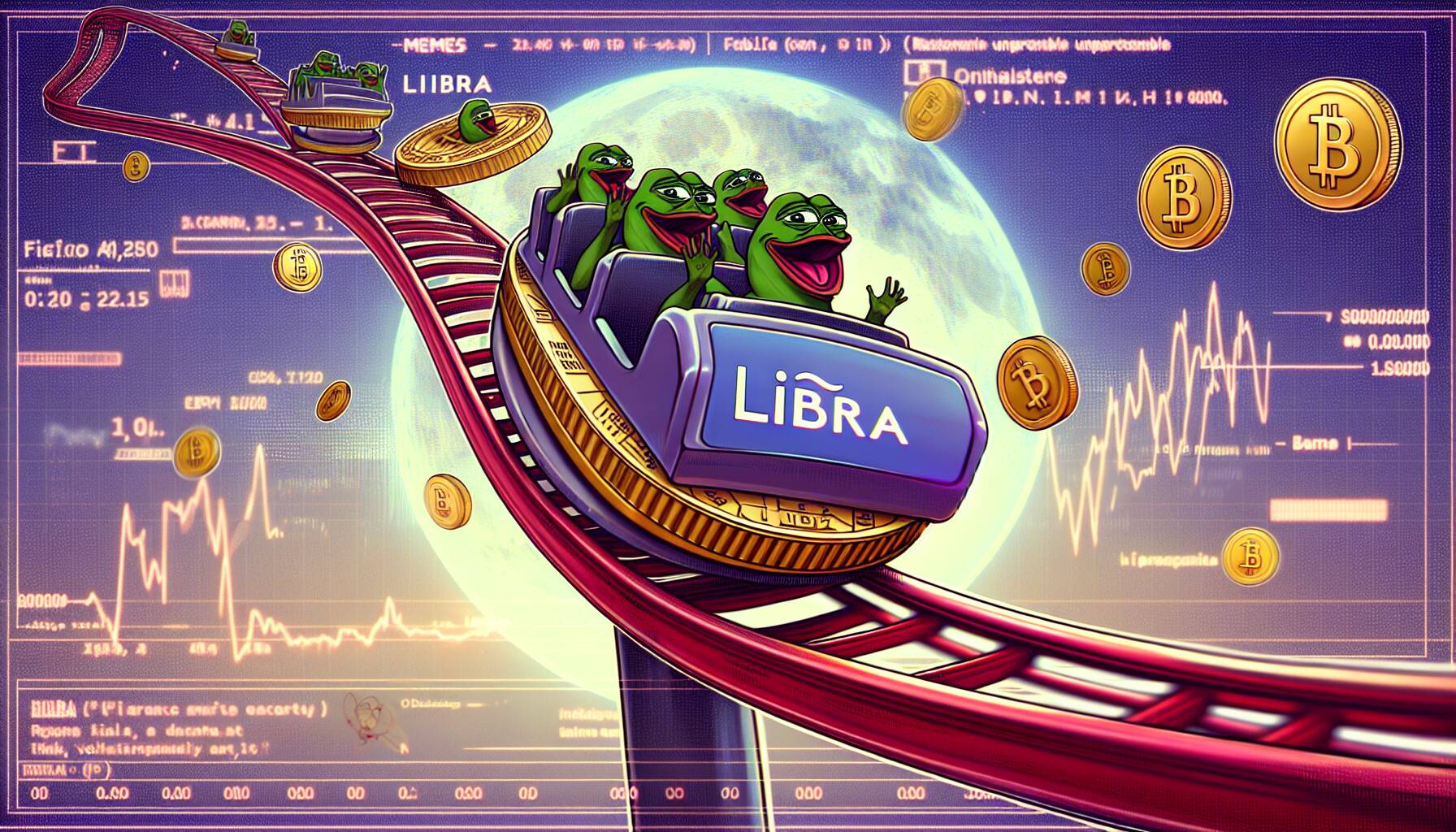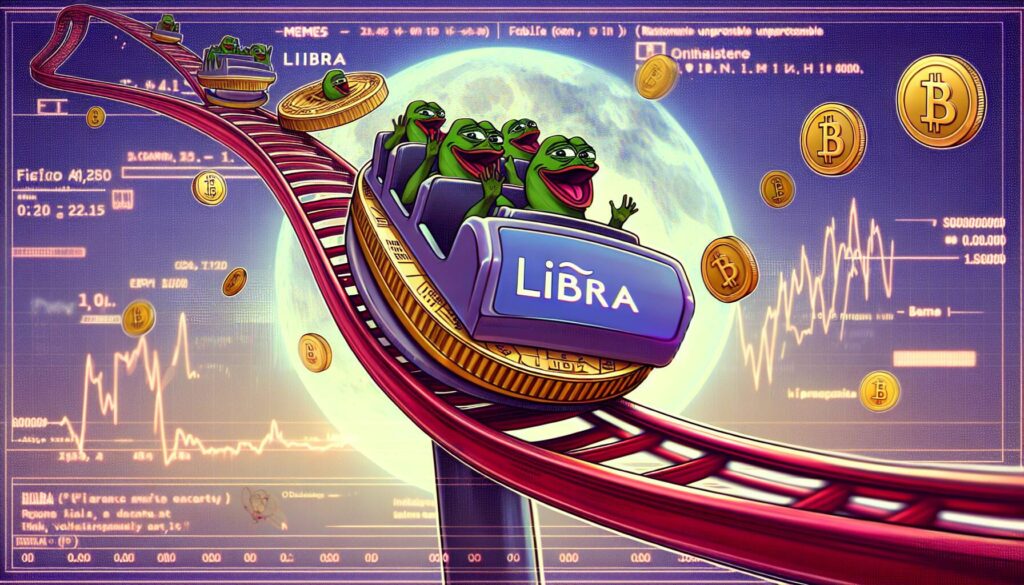The cryptocurrency landscape was shaken recently with the wild ups and downs surrounding the LIBRA memecoin, a product that entered the market on Valentine’s Day 2024. Originally touted by Argentinian President Javier Milei as a means to boost the nation’s economy, the token saw its market cap skyrocket to a staggering .5 billion within hours before plummeting over 80% shortly after as insiders quickly sold off their holdings, reportedly raking in nearly 0 million in profits. This sudden crash left countless investors grappling with significant losses.
As the dust settled from this chaotic episode, a storm brewed in the political realm. Milei attempted to distance himself from the project, removing his initial endorsement and laying the blame on his political opponents. This dramatization has led to calls for his impeachment, significantly impacting confidence in the Argentinian stock market. Meanwhile, revelations regarding the motivations and machinations behind the LIBRA launch emerged, adding layers to this intricate tale as speculation heightened surrounding potential collusion among influential figures.
“The LIBRA episode represents what is a potential point of oversaturation for the memecoin space,”
noted analysts, spotlighting a growing skepticism towards the entire category of memecoins, which has increasingly been associated with high-risk ‘pump and dump’ schemes. Prominent figures from the crypto sector expressed concern that the LIBRA incident could inflict a lasting reputational blow to memecoins, further fueling demands for more robust self-regulation within the community.
As the situation continues to unfurl, the LIBRA fiasco is emerging as a cautionary tale reflecting the broader challenges faced by the cryptocurrency market. While institutional investments in more established digital assets like Bitcoin and Ethereum are on the rise, incidents like this threaten to alienate retail investors who may be disenchanted by the volatility and unpredictability often tied to newer, speculative tokens.

Impact of the LIBRA Token Fiasco
The recent events surrounding the LIBRA memecoin have significant implications for investors and the broader crypto community. Here are the key points to consider:
- LIBRA Token’s Market Cap Plunge:
- The market cap skyrocketed to .5 billion before crashing over 80% in hours.
- Insiders cashed out nearly 0 million, impacting many retail investors.
- Political Fallout:
- Argentinian President Javier Milei’s involvement led to accusations of mischief and potential impeachment.
- The incident caused uncertainty in the Argentinian stock market, reflecting the interconnectedness of crypto and traditional finance.
- Reputational Damage to Memecoins:
- The LIBRA incident adds to the perception that memecoins are plagued by ‘pump and dump’ schemes.
- Experts warn of potential oversaturation and loss of interest in new memecoin projects.
- Calls for Self-Regulation:
- The community is urged to take responsibility to create a safer trading environment.
- Retail traders’ losses may drive demand for better governance within the crypto sector.
- Broader Impact on Cryptocurrency:
- The incident may deter retail participation in memecoins amidst growing institutional interest in more stable cryptocurrencies like Bitcoin and Ether.
- Moments like these pose potential barriers to attracting new investors, affecting the overall market sentiment.
“If we want to attract new retail users, this is not the way to do it.” – Chris Chung, founder of Titan.
The combination of market volatility, political strife, and reputational harm from incidents like the LIBRA fiasco serves as a critical learning moment for both individual investors and the crypto community at large.
Exploring the Fallout from the LIBRA Token Fiasco
The recent turmoil surrounding the LIBRA token, particularly its connection to Argentina’s President Javier Milei, underscores significant vulnerabilities within the memecoin arena. Following his endorsement that sparked a brief surge in LIBRA’s market cap to a staggering .5 billion, the subsequent hullabaloo—which saw the token plummet by 80%—raises critical questions about both the sustainability and the sheer volatility of similar projects. This incident parallels other notable mishaps in the crypto landscape, but it also reveals unique competitive dimensions that should not go overlooked.
Competitive Advantages and Disadvantages
What differentiates LIBRA’s collapse from previous crypto scandals, such as the FTX debacle, lies in its political dimension. The involvement of a sitting president adds layers of public scrutiny and regulatory interest, potentially steering a wider lens on crypto regulations in Argentina and beyond. This dynamic could either lead to stricter governance, thus enhancing the credibility of future ventures, or stifle innovation entirely, as retail investors grow wary of high-risk, politically entangled projects.
Furthermore, the rapid “pump and dump” nature of memecoins places them in a precarious position. As observed by Toronto’s FRNT Financial, the novelty of such projects is waning, with each new scandal contributing to a growing skepticism among potential investors. The LIBRA fiasco may discourage both retail investors and institutional players, particularly as the market shifts towards more established cryptocurrencies like Bitcoin and Ethereum, which promise greater stability.
Who Benefits and Who Faces Challenges?
On one hand, institutional investors could find opportunities in the current climate of skepticism, as they pivot towards assets with proven track records. However, retail investors seeking high-risk, high-reward opportunities may face significant hurdles. Many will likely reconsider their participation in new memecoins, driven more by fear of loss than the lure of profit. The lack of self-regulation within the memecoin community, as emphasized by figures like Chris Chung, indicates that this space might not be ready for the introspection and reform it desperately needs.
Moreover, competitors in the crypto space stand to benefit from the fallout. Established players that focus on regulated and backed cryptocurrencies could emerge as safer alternatives, potentially siphoning off investors disillusioned by volatile memecoins. Ultimately, while some may be left grappling with the repercussions of LIBRA, others may capitalize on the lessons learned from its explosive rise and fall.
















